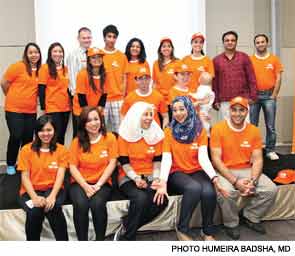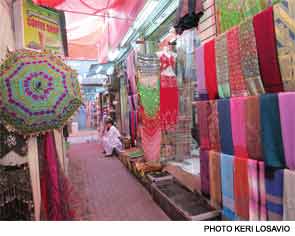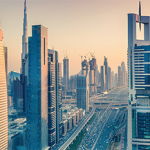

I planned to stay for only two years. Almost nine years later, I am still practicing rheumatology in Dubai, the United Arab Emirates (UAE). Why did I stay so long? Part of the answer lies in the hopeful look of a recent patient, Abdullah.
Abdullah’s Story
He is 16, like my teenage son. Unlike my son, Abdullah recently escaped horrific conditions in war-torn Damascus, Syria. When I met him, he had not been able to find methotrexate to treat his juvenile arthritis for six months and been unable to locate his rheumatologist for almost a year. Against all odds, his brother managed to get Abdullah a visa so he could visit him in the UAE. They drove two hours just to see me. He had fixed flexion contractures of his fingers, and all of his large joints were swollen, tender and barely moving. The erythrocyte sedimentation rate was 100 mm/hr.
I am saddened this boy does not have to deal with just the usual teenage angst of acne, which parties to attend or which girls to talk to. We started him back on methotrexate and steroids, but this regimen was insufficient, and his family could not afford the cost of biological drugs. Time was running out; his visitor’s visa was valid for just one month.
In 2007, we had founded the Emirates Arthritis Foundation (EAF) to help patients who cannot afford their treatment. This support allowed us to start Abdullah on anti-TNF therapy. Fortunately, he was granted a visa extension on medical grounds. After seven weeks of treatment, his arthritis remitted, and Abdullah experienced a growth spurt of a few inches. The hopeful look in his face turned to one of quiet joy.
When I am bogged down by the mundane, the endless paperwork, the hassles of dealing with health insurance rejections, the patient complaints and the overbooked schedule, I think of the EAF, and how it has made such a difference in the lives of many.
A Study in Contrasts
Dubai surprised me. I thought I was leaving the Boston suburbs to work in an oil-rich Gulf State and would be taking care of wealthy, pampered patients. Instead, I found a city with very little oil reserves that had the breathtaking audacity to want to be like New York, London or Paris. Buildings, financial service institutions, hotels and hospitals were being constructed at a crazy pace. However, the nascent healthcare sector still faced considerable challenges. The private healthcare sector was now being told to assume responsibility for the city’s predominantly expat population, a task that was previously performed by the government. My challenges lay in taking care of patients who could not afford the coverage. Dealing with an illness is one problem, but for a noncitizen resident of the UAE, being diagnosed with a chronic disease almost certainly meant the loss of their job and repatriation to their home country.
My first patient in Dubai was a wealthy, westernized Emirati who paid cash for his anti-TNF biologic used to treat his rheumatoid arthritis. My second patient was a gardener who earned $200 a month. His monthly salary would not cover the office visits, any lab tests or even methotrexate. Fortunately, we could treat him without cost, and as a result, his life has been transformed. He can work and send money home to support his family in Pakistan.
These examples are constantly repeated in my practice. One day I may care for royalty and business executives for whom the costs don’t matter, and the following day I may see maids and drivers who can’t afford the cost of any care.

Patient Support Group Created
I was fortunate to gather together a group of people who believe passionately in finding a solution to the inequity in medical care in the UAE. Mohamed Al Hashimi is a prominent Emirati businessman who suffers from ankylosing spondylitis. With his support, we created the EAF, the first patient support group for any disease in this region. By speaking about his illness, we have started to remove the stigma attached to chronic disease in this society.
Suzanne Al Houby, a businesswoman who has scaled great professional and personal heights (she is the first Arab woman to summit Mount Everest and conquer many of the world’s tallest peaks), became a cofounder.
We launched the foundation in 2007 under the patronage of Princess Haya, Bint Al Hussein, wife of Sheikh Mohamed Bin Rashid Al Maktoum, ruler of Dubai. We raised almost $1 million through private and philanthropic donations and spent more than 70% of this amount on direct patient care.
The stories have been remarkable. A 30-year-old Indian nurse came to us, unable to walk or care for her 1-year-old child, due to end-stage secondary osteoarthritis of her knees caused by her inflammatory arthritis. The EAF was able to cover the cost of her knee replacement surgery and her biological drug therapy. To date, the EAF has paid for the care and treatment of more than 40 patients.
The financial crisis of 2009 hit Dubai hard. Private donations dried up. We changed our focus and concentrated on awareness building, patient support groups and walkathons. Katrina Thornely, a British expat who has suffered from juvenile arthritis since the age of 2, has been a driving force behind the EAF. We are fortunate to have many others who have volunteered their time and effort on behalf of the Foundation.
Recently, Naveed came to see me. He was one of the first patients to receive financial support from EAF. When we first met him, his arthritis was debilitating, and his prognosis was grim. Today, his future looks bright. He is an active and productive member of the workforce. His family is growing, and he has found joy. the rheumatologist
Humeira Badsha, MD, has spent more than 20 years as a rheumatologist in three countries—the U.S., Singapore and UAE. She moved to Dubai in 2005 from Boston to work at Dubai Bone & Joint Center. She currently works at her own practice.
